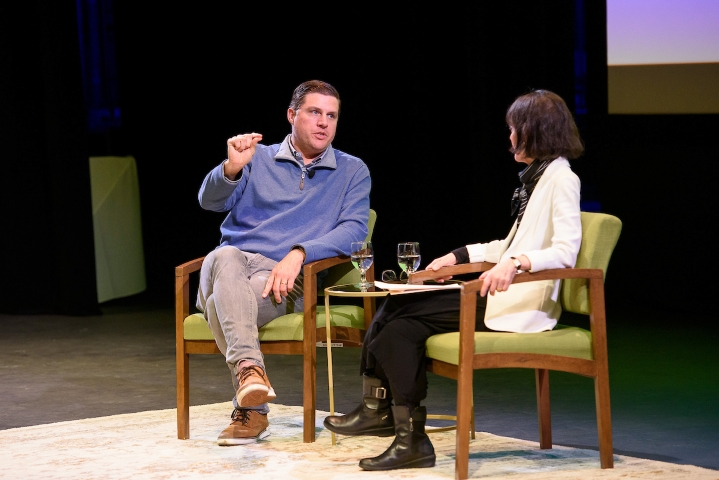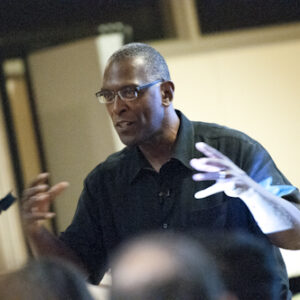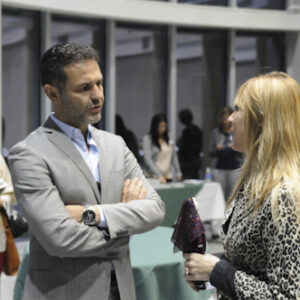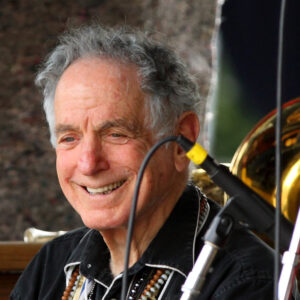On Sept. 19, Harker hosted a special event for the Common Ground Speaker Series, featuring David Yeager, Ph.D., discussing his new book, “10 to 25: The Science of Motivating Young People.” Joining him was Carol Dweck, Ph.D., author of the bestselling 2006 book “Mindset.” Yeager, who earned his doctorate from Stanford in 2011, is now the Raymond Dickson Centennial Professor at the University of Texas Austin’s Department of Psychology. Each year, the Common Ground Speaker Series organizes speaking events in a wide variety of fields for its member schools, which host the events at locations around the Bay Area.
After a greeting from assistant head of school Jennifer Gargano, Dweck introduced Yeager with a thorough rundown of his credentials and achievements. “I had the great privilege of being his advisor and supervising his amazing Ph.D. research on the mindsets that underlie bullying and that underlie victims’ responses to bullying,” she said. Although this research won him many awards, Dweck continued, “the real story is his heart. He cares incredibly deeply about the well-being of adolescents and almost all of his research from day one has been aimed at how to improve their learning achievement and mental health.”
After taking the stage to loud applause, Yeager took his seat beside Dweck for the ensuing conversation. Early in the talk, he addressed the notion of parenting adolescents as a particularly troublesome time for parents. “If you tell people that you teach middle schoolers, they pat you on the back because you’re doing great work, right? If you have teenagers in your house, it’s just pity,” he joked, before remarking how ideas about adolescence as an “awful developmental phase” have become common. “And I think a deep-seated reason why we think that is because [parents] see [adolescents] make very poor decisions,” he said. They seem to not listen to us and we’ve kind of convinced ourselves that the problem is a deficiency that is deeply biologically rooted in their brains.”
Pushing back against that idea, Yeager mentioned a term he coined in his book: grownsplaining. “The idea is that, if I could transmit the contents of my rational mind, as the grown-up who understands what’s in your best interest, then you would make rational decisions,” he said. “And the fact that you don’t immediately accept what I think means you’re illogical and irrational.” This thinking, he said, is based on a misunderstanding of the perspectives of young people, which he compared to American tourists trying to speak English to citizens of foreign countries. “It’s the developmental equivalent of the stereotypical American who goes to a foreign country, tries to speak English to someone and then just yells English louder,” he said.
From the adolescent perspective, this experience can feel dismissive and hurtful. “We grownsplain, then in their minds, they’re thinking, ‘who’s this yelling at me?’ and treating [them] like an idiot, and that doesn’t feel good,” he explained. “So they don’t do what they’re asked.”
Yeager outlined different parenting mindsets that tended to be problematic when raising adolescents. The enforcer mindset believes that adolescents are naturally incompetent and need to be shepherded through parental authority. “And that is a mindset in which you are trying to uphold the standards of society,” he said. “You’re trying to be an authority figure. You’re, in some ways, the last bastion of sanity in a world gone wrong.” Yeager summarized the enforcer mindset as “very high standards, but … little support.”
The protector mindset on the other hand, is supportive but has very low expectations. “As the protector, you can still put your head on your pillow at night and feel like a good person because you’re like, ‘at least they know I love them,’” he said.
These mindsets, Yeager observed, both lead to negative outcomes. “Neither of those is fully satisfying because they don’t really work with what young people need,” he said. An emergent model sees adolescents as people seeking status and respect. “The wonderful idea here is that adolescence can be a time of tremendous motivation, learning and accomplishment if we honor and support these needs,” he declared.
Approaching parenting from a mentor mindset holds adolescents to high standards while offering them sufficient support to meet those standards. This model treats the adolescent as “someone who can do something impressive, so it’s a respectful stance,” Yeager said. Making a comparison to a workplace boss who berates employees, by contrast, “in the mentor view, I’m taking you seriously. I care about you enough to spend time helping you improve.”
The full video of the talk will be made available online at the Common Ground Speaker Series website.










